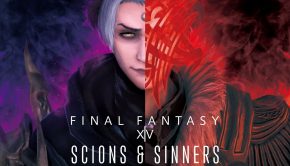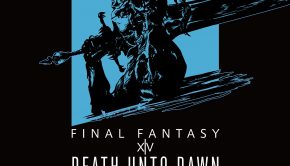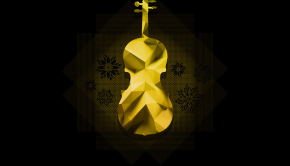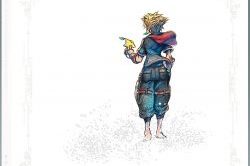The Keyblade War
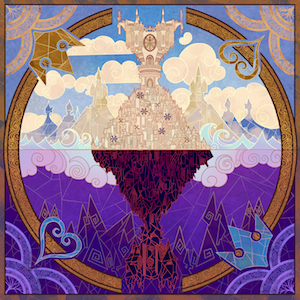 |
Album Title: The Keyblade War |
| Record Label: Materia Collective |
|
| Catalog No.: MCOL-0279 |
|
| Release Date: March 27, 2020 |
|
| Purchase: Buy at Bandcamp |
Overview
The Keyblade War is an unofficial arrangement album by Rozen + Reven. It is the second full-length album for the duo, the first being NieR: Glory to Mankind. The two are joined by the Sofia Session Orchestra and Choir for about half the tracks, and the ETHEReal String Orchestra and other soloists for other tracks. Here they tackle the music of Kingdom Hearts, covering themes up to the latest game, Kingdom Hearts III, even before the official soundtrack release for it. Like the another notable fan arrangement project, Project Destati (whose member Sebastian Wolff also produces The Keyblade War), this album weaves together many of the series’ motifs into tracks where they were note originally found, but Rozen and Reven also go farther by developing their own distinct sound, varying instrumentation and even working in new original melodies. The soundscape for some of the tracks is thus farther removed from the Yoko Shimomura’s originals, though the tone and atmosphere is still very much in keeping with the games. The result is a solid arrangement album that brings a fresh palette to familiar melodies, while also harnessing the narrative potential of the originals.
Body
The album begins with “Destati”, one of the tracks that features the Sofia Session. At first the track plays it straight, hewing close to the original with the only real difference being the (surprisingly subtle) electric guitar addition. But at the two-minute mark, things strip back to introduce a short new motif, one that is very simple but effective in producing a more cinematic atmosphere. The track then rebuilds over top of this new motif to an exciting climax in a great balance of old and new. In a similar vein is “Master vs. Master”, a combination of “Master, Tell me the Truth” representing Eraqus and “Forze dell’Oscurita” for Xehanort. The alternation between the themes is a lot of fun, and the bombast of the rockestral arrangement easily covers for the fact that Sofia could not be involved with it. Although the original is not a battle theme, “Hollow Bastion” is arranged here like one. It too features an electric guitar as support, and with percussion and synth the track has energy and edge. There is a welcome breather from the piano, and some neat variations on theme peppered in. Then there is “Darkness”, an album highlight that combines new material with elements of “Hikari” and “Dearly Beloved” in an epic orchestral track. The new material is very Shimomura-esque in rhythms, and the fragments of “Hikari” throughout are such that even those very familiar with the original will have to work to identify them all, but this is what makes it a rewarding listen. The track is ultimately grounded by its heavier usage of “Dearly Beloved”, and it all comes together in a rousing piece that would sound right at home as a major boss theme in a Kingdom Hearts soundtrack.
Integral to every Kingdom Hearts album are the character themes, of which there are a handful here. The first of these is “Princess of Heart ~Kairi~”, a fairly straightforward adaptation of the theme that expands the dramatic range of the track. There is some spattering of “Dearly Beloved” throughout, but the stage is Kairi’s, told mostly through piano and strings. Unfortunately Sofia Session does not feature here, so the string library lets down the track a bit, but it is still a lovely arrangement for a lovely theme. Then there is “Promise”, a medley of “Ventus”, “Roxas”, and “Musique pour la tristesse de Xion”, with a touch of “Destati” for atmosphere. It is all fairly straightforward, on the sombre side with the occasional swells from the strings. Xion gets a more focus in “No. i (interlude)”, but here the theme is much more atmospheric and sparse, with light pads and warm chords. Given how much attention the theme has received elsewhere, this take is quite refreshing and quietly moving. Then there is “Organization XIII”, which keeps most of the original piano but differs in its strings arrangement, here more sweeping and dramatic, giving the track a very different tone, and re-contextualizing what comes after.
The remaining instrumental tracks are varied. “Dearly Beloved” gets its own track, surprisingly featuring much more synth throughout, although the strings and piano remain prominent so it doesn’t sound out of place. It’s a solid take on a theme that has already been bountifully arranged, even if it’s not groundbreaking. Better is “Between Light and Dark”, a medley of the Foretellers’ theme, “Dearly Beloved”, and “Destati”. There are some great moments throughout such as the organ solo, Reven’s counterpoint on vocal, and the combination of themes towards the end of the track. An album highlight is “The Final World”, a beautiful track from Kingdom Hearts III. It is recreated here, and then nicely developed with reharmonizations, quotes of “Dearly Beloved”, and great vocals by Reven. The album closer is “The Keyblade War”, another wonderful new take on “Hikari”/“Simple and Clean” and “Dearly Beloved” (with quotes of many other themes). But instead of being a battle arrangement like “Darkness” was, it is here a victorious arrangement that feels like it would make for a great credits track. It’s great to hear “Hikari” used so prominently in these tracks, since it doesn’t get as much usage in the official Kingdom Hearts soundtracks, and the expansive and varied seven-minute arrangement here does both themes justice.
In addition to these instrumental themes, the album also covers all of Utada Hikaru’s the vocal themes for the series. “Simple and Clean” is the first, largely based on the official “Hikari” orchestral arrangement, the key difference being that the melody here is that of “Simple and Clean”. Unfortunately I don’t find that the vocal production fits well, as I think a strong solo vocal would be better than the pop-style doubling and layering used here. But these issues don’t detract from the track too much, and there are plenty of moments that really work, such as the lovely stripped down segment where Reven is supported only by piano. “Sanctuary ~After the Battle~” takes more of a departure in arrangement and instrumentation, focusing on atmosphere and vocals. There is a neat inclusion of figures from “Roxas”, as well as the original Japanese bridge from “Passion” with effective little harmonic changes, making it one of my favourites. Then there is “Face My Fears”, which builds on the World of Tres arrangement. Whereas the official orchestral arrangement falters in relying solely on strings, Rozen and Reven wisely bring in the rest of the orchestra here in addition to the main vocal, which results in a balanced and full arrangement. I only wish that it fully unleashed for a chorus at its climax, rather than cutting out to end quietly. Then there is “Don’t Think Twice”, which again combines the vocal with a modified version of the official orchestral arrangement. I think the orchestra here could have been adapted a bit more to better suit the inclusion of the vocal, but I’m sure some will find this version more fitting as a closer than the original did with its R&B stylings.
Summary
The Keyblade War is a wonderful arrangement album for the Kingdom Hearts series, making great use of the melodies and motifs of the original soundtracks while also presenting them through a distinct, but not alienating, sound. The instrumental tracks are solid rearrangements that expand on their originals, often even with new material, and their diverse styles are held together by their shared motifs. The vocal tracks also do a decent job of combining the vocals with the variants of the official orchestral arrangements, with just a few minor shortcomings. The performances are strong throughout, though there are some spots where the sound quality holds back the ideas when the live orchestra is not used. Even the physical package looks to be quite nice, sporting inspired art. Altogether, the album is easily in the upper level of arrangement projects, with detailed arrangements that will reward the discerning listener, marking Rozen and Reven as a duo to keep an eye on in the future. Fans of the series should definitely check the album out, particularly for the wonderful instrumental reworkings of “Hikari”.
Do you agree with the review and score? Let us know in the comments below!
4
Posted on April 29, 2020 by Tien Hoang. Last modified on May 7, 2020.

